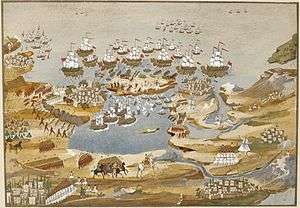Battle of Sphacteria (1825)
The Battle of Sphacteria was fought on 8 May 1825 in Sphacteria, Greece between the Egyptian forces of Ibrahim Pasha and Greek forces led by Captain Anastasios Tsamados along with Alexandros Mavrokordatos.
| Battle of Sphacteria | |||||||
|---|---|---|---|---|---|---|---|
| Part of the Greek War of Independence | |||||||
 Depiction of the Battle of Sphacteria and the siege of Navarino, as depicted by Panagiotis Zographos | |||||||
| |||||||
| Belligerents | |||||||
|
|
| ||||||
| Commanders and leaders | |||||||
|
Anastasios Tsamados † Anagnostaras † Alexandros Mavrokordatos | Ibrahim Pasha of Egypt | ||||||
| Strength | |||||||
| 1,000 Greeks,[1] plus 8 ships | 3,000, plus ca. 45 ships | ||||||
| Casualties and losses | |||||||
| 350 dead[2] | |||||||
Battle
Commanding both a powerful army and navy, Ibrahim initiated attacks on both Paliokastro and the island of Sphacteria. As a result, Mavrocordatos rushed to their defense while Captain Tsamados from Hydra held off Ibrahim's forces.[3]
Ibrahim aimed to capture the strategic small island of Sfaktiria at the center of the bay. Fifteen hundred Egyptians landed on the island only to be met with resistance by Tsamados who led a small contingent of sailors and soldiers. Shot in the leg, Tsamados continued fighting until he was killed. During the battle was killed also Santorre di Santa Rosa.[4]
The remaining Greek sailors with Mavrocordatos rushed back to their ship, the Aris, and sailed through a bombardment of thirty-four ships. For four hours it was bombarded and the casualties entailed two dead along with eight wounded.[5] Finally, the Greek fleet and the Greek brig Aris escaped the destruction after hours of fighting and bombardment. [6]
Aftermath
Days after the battle, the Greeks surrendered Neokastro to Ibrahim.
In a desperate action, admiral Miaoulis decided to attack and burn the Egyptian fleet at Methoni. Finally, using fire ships, he succeeded to destroy 12 ships (including a corvette and a frigate), but it had no impact on Ibrahim, who now had the mainland base he wanted.[7][8]
References
- Paparigopoulos, K, History of the Greek Nation (Greek edition), vol. 6, p. 163164
- Paparigopoulos, K, History of the Greek Nation (Greek edition), vol. 6, p. 164
- Paparigopoulos, K, History of the Greek Nation (Greek edition), vol. 6, p. 163-164
- Paparigopoulos, K, History of the Greek Nation (Greek edition), vol. 6, p. 164
- Smith and Felton, p. 641. [Footnote] "In May, 1825, Ibrahim Pacha attacked Palaeo-Castro and the little island of Sphacteria, with a powerful fleet and army. Mavrocordatos had rushed to their defence. He threw himself with his suite into the island, which was at the moment held by a brave young Hydriote captain named Tsamados, and a small body of soldiers and sailors. Fifteen hundred Arabs landed on the island, but met with a desperate resistance from Tsamados and his gallant band. Tsamados was shot in the leg, but continued fighting on his knees until he was knocked down and killed. When this was known, the sailors, regaining their brig, on board which Mavrocordatos had already taken refuge, ran out through the Turkish fleet of thirty-four ships of war, and, having been exposed for more than four hours to their fire, escaped with riddled sails and rigging shot away, with two men killed and eight wounded. The surrender of Navarino followed; and not long after, the whole Morea, except the unconquerable Maniotes, lay at the mercy of Ibrahim."
- Paparigopoulos, K, History of the Greek Nation (Greek edition), vol. 6, p. 164
- Paparigopoulos, K, History of the Greek Nation (Greek edition), vol. 6, p. 163-164
- Ιστορικά θέματα
Sources
- Smith, William and Felton, Cornelius Conway. A History of Greece: From the Earliest Times to the Roman Conquest, with Supplementary Chapters on the History of Literature and Art. Hickling, Swan, and Brown, 1855.
- Paparigopoulos, K, History of the Greek Nation (Greek edition), vol. 6, p. 163-164